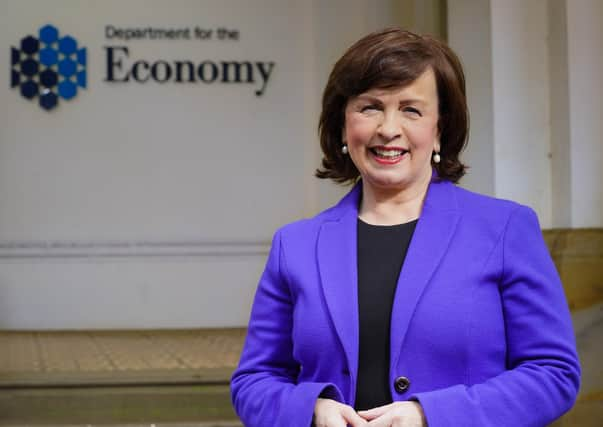UFU reps meet with Dodds


UFU deputy president David Brown said: “We met with the Economy Minister to relay our concerns regarding the RHI consultation however, the outcome left us extremely frustrated. Recent Assembly questions revealed that 99.76 percent of RHI payments to boiler installations were paid legitimately to businesses who had a genuine need for renewable heat. This figure gives a lie to the accusations in the media, that vilified genuine participants and contributed to the collapse of our Government. DfE talked a lot about introducing a new green energy scheme to replace RHI, however we made it clear that businesses have been so deeply affected by how they’ve been treated, that it’s unlikely that they will put their trust in any future DFE scheme.”
The RHI scheme in Great Britain (GB) continues to operate and the UFU are seeking parity with their counterparts. The GB tariffs, which are binding for 20 years, are based on what is available on the date the participant joins the scheme.
Advertisement
Advertisement
“The DfE have completely ignored the Buglass and Select Committee recommendations of parity with GB. No GB boiler owner has ever faced retrospective cuts. Their tariff rates were only ever cut for new applications whilst today’s GB tariffs are almost £10,000/year, NI participants were cut to £2,200/year,” said Mr Brown.
“In GB they can also remove an old boiler and replace it with one the same size or smaller and continue on the same tariffs. NI boiler owners cannot do that here. If they did, the new boiler wouldn’t qualify for RHI.”
To add further problems, the DfE’s baseline for counter factual fuel prices is out of date. For the consultation they retrieved oil prices from June 2019 to May 2020 and yet the consultation was launched in February 2021.
When questioned about the potential closure of the scheme, the DfE offered no assurances as to what any potential new scheme will look like, the UFU say.
Advertisement
Advertisement
“To close the scheme would adversely affect NI agriculture’s carbon emissions. The frontrunner for 2021 is climate change with the UK preparing to host the UN Climate Change Conference at the end of this year and yet, if the NI RHI scheme were to close in the months ahead it would inevitably cause a shift back to fossil fuels,” said Mr Brown.